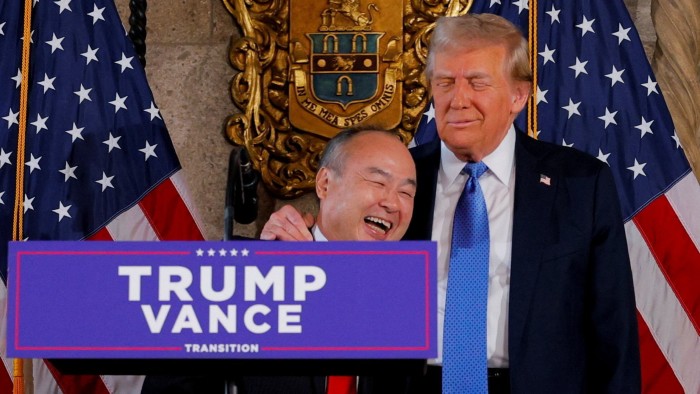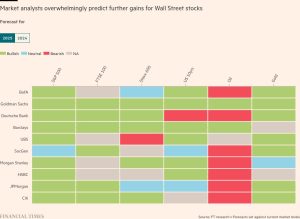Japan’s SoftBank woos Trump with planned $100bn investment in US

This article is an on-site version of our FirstFT newsletter. Subscribers can sign up to our Asia, Europe/Africa or Americas edition to get the newsletter delivered every weekday morning. Explore all of our newsletters here
Good morning. In today’s newsletter:
-
SoftBank pledges $100bn investment in US
-
Court names alleged Chinese spy linked to Prince Andrew
-
How China is setting up shop in Mexico
Japan’s SoftBank yesterday unveiled plans to invest $100bn in the US, in the latest sign of how companies are rushing to ingratiate themselves with Donald Trump.
Masayoshi Son, SoftBank’s billionaire chief executive, stood next to the president-elect at Mar-a-Lago as the pair formally announced the plans.
“I would really like to celebrate the great victory of President Trump,” Son said, adding that he was “excited” by the planned investment and also hoped that Trump would “bring the world into peace again”.
The maverick investor, who made a similar move after Trump won the presidential election in 2016, will focus the new investment on creating AI-linked jobs and infrastructure projects, a person familiar with the matter said. It is unclear how Son, who is known for his lofty pronouncements, will be able to fund his $100bn investment pledge.
Son’s announcement comes as US technology groups, led by Amazon and Meta, have moved to make big donations to the fund for Trump’s inauguration in January. Read more on SoftBank and corporate America’s efforts to curry favour with the incoming president.
-
More on Japanese business: Hitachi’s new chief executive Toshiaki Tokunaga, announced yesterday, is facing high expectations after taking over a conglomerate that has undergone a digital makeover.
Here’s what else we’re keeping tabs on today:
-
Economic data: Hong Kong reports November labour market figures.
-
Cross-strait relations: Shanghai vice mayor Hua Yuan attends an intercity forum in Taipei in a rare visit that comes after China conducted large-scale military exercises around Taiwan.
Five more top stories
1. North Korean troops have fought for the first time alongside Russian forces against Ukrainian soldiers in Russia’s Kursk region, the US said yesterday. The North Korean soldiers “have suffered casualties, both killed and wounded,” a Pentagon spokesman told reporters. Read the full story.
2. The alleged Chinese spy linked to Prince Andrew has been publicly named as Tengbo Yang after a judge lifted an anonymity order, raising fresh questions about his connections to the British establishment. MI5 has alleged that Yang — who advised UK companies spanning GSK and McLaren — gathered intelligence on behalf of the Chinese state. The 50-year-old Chinese national called the allegations “entirely untrue”.
3. Germany is heading for early elections after Chancellor Olaf Scholz lost a vote of confidence, a widely anticipated result that ends his fractious three-party coalition government. “We were all fed up with each other,” said Robert Habeck, the economy minister in Scholz’s government. Here’s what to know about the upcoming vote in February.
4. Brussels fears divisions between member states will hamper its ability to combat a potential flood of cheap goods from China — dumped by Beijing in response to the prospect of higher US tariffs — with sanctions of their own. Worried that traditional trade measures would be too slow to deploy, policymakers are pushing for more EU powers to respond.
-
Chinese economy: Retail sales in China missed expectations in November, adding to pressure on Beijing policymakers to boost the economy.
5. Australia’s markets regulator has sued HSBC for what it called “widespread and systemic failures” in protecting customers against scammers. The Australian Securities and Investments Commission said yesterday that scammers had cost HSBC Australia customers A$23mn ($14.6mn) between 2020 and 2024, with some customers losing more than A$90,000.
Visual story

Over the past few years Chinese companies have established themselves in Mexico’s supply chains, developing stronger trade links and increasing manufacturing. While president-elect Donald Trump has threatened Mexico’s government with tariffs, China is setting up shop in America’s backyard, causing concern among trade officials in the US and Canada.
We’re also reading . . .
-
Economic unfairness in South Korea: The next government has to break out of the shackles of cold war politics and implement more egalitarian policies, writes Ha-Joon Chang.
-
Pakistan military’s ‘Imran Khan problem’: Even behind bars, the hugely popular former prime minister is seen as the biggest threat to the armed forces in half a century.
-
Bet against ‘American exceptionalism’: All the enthusiasm about US stocks only confirms that “the mother of all bubbles” is at a very advanced stage, writes Ruchir Sharma.
Chart of the day
A mental health pandemic is engulfing the world’s workplaces, with financial services among the hardest-hit sectors. With depression and anxiety costing the global economy $1tn annually, Clive Cookson and Amy Borrett explore how employers and governments are tackling the crisis in this first instalment of the Global Crisis in Mental Health series.
Take a break from the news
Columnist Stephen Bush makes a compelling case for school uniforms, and why the Christmas season should remind us of their value.

Thank you for reading and remember you can add FirstFT to myFT. You can also elect to receive a FirstFT push notification every morning on the app. Send your recommendations and feedback to [email protected]
Recommended newsletters for you
One Must-Read — Remarkable journalism you won’t want to miss. Sign up here
Newswrap — Our business and economics round-up. Sign up here
#Japans #SoftBank #woos #Trump #planned #100bn #investment





